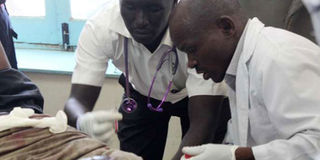Doctors shun north Kenya due to insecurity

Doctors attend to an injured man in Kisumu County Hospital on May 23, 2016. Doctors have declined to report to work in nothern Kenya saying it is unsafe. PHOTO | TOM OTIENO | NATION MEDIA GROUP
What you need to know:
- Mr Yatani said in spite of high salaries and incentives given to doctors, none of the six medics posted to his county had begun work.
- Several times in the past, suspected Al-Shabaab terrorists have attacked Mandera Governor Ali Roba, killing and injuring his aides.
Doctors posted to northern Kenya a month ago have not reported to work because of insecurity.
The medics are among the 464 doctors seconded to counties by the national government.
Governors Ukur Yatani (Marsabit), Ali Roba (Mandera) and Ahmed Abdullahi (Wajir) on Monday said the situation had affected services since patients queued for hours.
Mr Yatani said in spite of high salaries and incentives given to doctors, none of the six medics posted to his county had begun work.
“It becomes difficult to explain to residents why doctors do not want to work here. We are ready to pay a monthly salary of Sh500,000 and provide decent housing to any specialist willing to work in Marsabit,” Mr Yatani told the Daily Nation.
Governor Yatani invited professionals to Marsabit saying the region was secure.
“Marsabit residents are friendly. We are ready to give bonuses to specialists,” he said in Moyale when he met representatives of UN agencies.
The governors said the perception that northern Kenya was insecure was to blame for doctors and other professionals shunning the region.
Several times in the past, suspected Al-Shabaab terrorists have attacked Mandera Governor Ali Roba, killing and injuring his aides.
Mr Roba said doctors were only interested in working in Nairobi, adding that the few who were willing to work in Mandera gave conditions that could not be met by the devolved government.
“Hospitals in Nairobi have enough doctors. Some doctors posted here do not want to work in sub-county hospitals and demand to be given super rates before they are posted,” he said.
STAFF SHORTAGE
Mr Abdullahi said doctors who reported to Wajir went back to the national government.
“Why would doctors demand to be employed yet they want to choose where to work?” he asked.
Earlier, it was reported that devolved governments were refusing to absorb more doctors despite the huge shortage of personnel.
Council of Governors Chairman Peter Munya said devolved units had not received grants from the national government to employ more doctors.
“We do not have money to pay their salaries,” Mr Munya said.
Out of the 757 new doctors ready to be absorbed, the devolved governments say they can only take 464.
According to the Economic Survey 2016, Kenya has 9,734 doctors serving nearly 46 million people. This translates to one doctor for nearly 5,000 Kenyans.
The World Health Organisation recommends a doctor for every 600 people.




